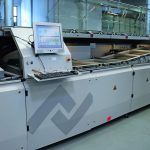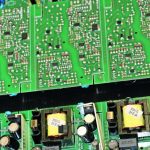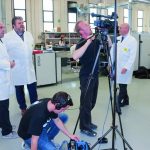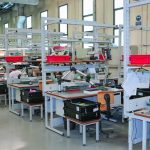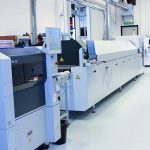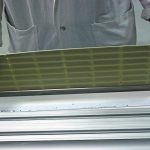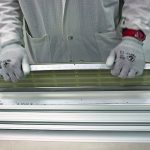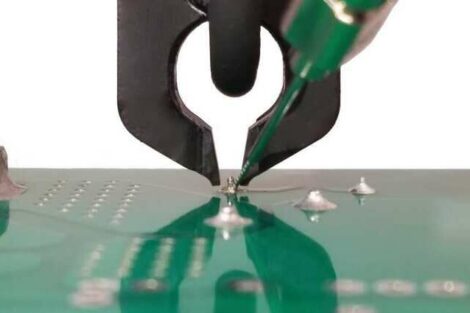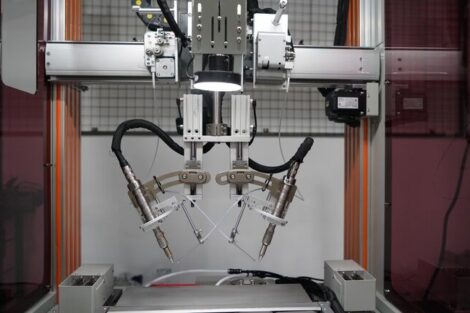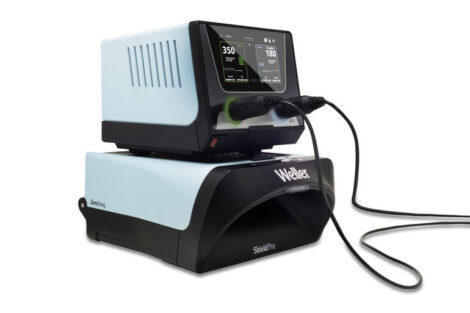Although LEDs (light-emitting diode) have a significantly higher light output than light bulbs, they do require high demands of energy. If they are not optimally supplied with energy, flickering of lights or unsteadiness can occur. In order for this not to happen, LED drivers are the solution. TCI is one of the leading LED manufacturers based in Saronno, Italy and known for their extensive range of LED modules, drivers and converters.
Privately owned for 30 years, TCI has around 250 employees to ensure all manufactured LED applications function properly and flawlessly. An LED module is not solely responsible for a perfect functioning light source or different dimming capabilities. This is why, in addition to LED converters, LED drivers are also necessary. Converters guarantee that the input voltage is transformed into a constant output voltage, whereas drivers provide a constant output current and can often produce a constant output voltage. The different types of dimming available is also interesting. As well as the fact that even small voltage changes affects the current and fluctuations of current, which can easily destroy LEDs.
Groundbreaking technology
The Italian manufacturer is a specialist in LED applications with an increasing clientele to customers worldwide. Although TCI began to produce modules only 6 years ago, this area continues to expand. According to Plant Manager, Ing. Alessandro Gallingani, 175 different LED modules are produced on a weekly basis. He also emphasizes that they do not only produce standard designs. The needs and wishes of their customers are very important, which means they try to realize all special requests. The company is currently expanding their production area to a new 5,000 m² building. To meet the needs of the growing market, this new site will mainly produce LED modules between 1.20 m and 1.50 m in length, as well as, driver-on-board modules.
The manufacturer is also focusing on pushing innovations in the area of LED drivers forward. All special requests are taken into consideration, not only standard designs. From a blank paper to the prototype, all requests are made within 20 days. The company brought on a knowledgeable research and development team, putting them in the forefront of the market. They are currently producing drivers that have integrated Wi-Fi or Bluetooth modules.
The idea behind this is to go in the direction of Smart Environment, where all light sources and the luminescence of the LEDs will be controlled or modified remotely by only one person. In the future, the light should be able to control itself, adapting to external lighting conditions, and eliminating unnecessary electricity costs. The company’s imagination shows no boundaries, which in combination with high flexibility, they will continue to grow exponentially. Long-term partnerships are also a sign for continuous stability, which the manufacturer has with Ersa. With their long-term collaboration of 20 years, Ersa has helped the manufacturer realize their innovative ideas with the use of their soldering equipment. In addition to two Powerflows N2 in the THT section of the driver manufacturing, the SMD department has a Versaflow and four Hotflows with two different models. There are also four other Hotflow machines from Ersa in the module assembly line. The focal point of this article is on the THT area where drivers are manufactured, so the focus will be on the Powerflow N2.
Demand for soldering in LED applications
Wave soldering is predestined for wired electronic components or connector elements, even if the control of the process is more complicated than in reflow soldering. Several factors, such as soldering alloy, flux, preheating temperature, wetting time and the atmosphere in the soldering module play a crucial role in the quality of the result. In the assembly production, TCI uses two Powerflow N2 from Ersa to produce LED drivers. An SMD process accompanies the bottom of the double-sided circuit board, while the top side is responsible for the current of components, such as electrolytic capacitors, electrical resistors, coils, and other components associated with through-hole mounting. This process is carried out on 12 THT lines with approximately 60 employees, the majority being women. The Plant Manager, Alessandro Gallingani, exclaims: “There is currently no technology that could reduce the size of our components with its current dimensions. In addition, the space between the THT components is very small, so much so that this could not be handled automatically. Our design of the modules for the LED drivers requires manual work, especially on the top where the electrical functions are. Our THT seats are filled with 90 % of our staff who are concentrated on this work alone.”
The two full tunnel wave soldering systems, Powerflow N2, are the perfect addition to the production of well-functioning LED drivers. To handle the long and narrow LED strips, the soldering systems are equipped with special belts and special carriers that ensure planarity. The spray flux systems have a flow rate setting that allows for a fine and accurate deposition, which decreases the waste of flux. VOC-free water based fluxes can also be used. The 2-head spray fluxer with the intelligent pattern spraying programming is even more precise than the previously pneumatically driven motor control. This ensures less residue on the printed circuit board, as well as the end of complex manual cleaning with a brush, saving exponential time and cost. The preheating concept with convection, as well as medium and short wave infrared emitter modules reduces faulty soldering points by approximately 40 %. Particularly with large mass-efficient components, that are available at TCI, the configurable preheating concept of the system ensures uniform heating without overheating. Only high quality materials are used for soldering, so that the solder cannot react with the surface. The use of the Wörthmann wave ensures a complete wetting of the SMD pads. This causes fewer soldering bridges and a positive soldering result, especially with the difficult THT components of the LED drivers. Alessandro Gallingani further confirms this: “We have not only reduced problems involving soldered assembly by about 40 %, but we have also increased our production by 25 %, all thanks to the wave soldering systems.” Another positive aspect of the systems is the multi-stage cleaning systems, which minimizes maintenance times. Throughout the preheating zones and the soldering units, a part of the atmosphere is constantly absorbed, cleaning the central module. The three gas streams are never mixed, which helps prevent the residual oxygen content in the soldering module from forming air pockets. The constant change of the atmosphere prevents overheating of the gas and helps to stabilize the thermal conditions. All of this has an easy-to-use control system concept with simple operation via a desktop-PC or touchscreen.
TCI is not looking to forgo this collaboration with Ersa, as the Plant Manager confirms: “We have many advantages with this long-term cooperation with Ersa. Not only is the company trustworthy, but they also provide great support, along with their innovative equipment. I also would like to include Packtronic and their Managing Director, Luca Fiorucci. If we ever have any problems with one of the systems, support is directly here to investigate deeper and find an efficient solution. We also receive specific instructions to be able to start production as quickly as possible.” (dj)
SMT Hybrid Packaging, Booth 4-111
Share:


